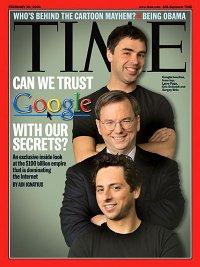Five more Google New Year resolutions


(Here are Eric Schmidt, Larry Page and Sergey Brin on the cover of Time. Beware such fame, for it is fleeting. It is an attempt to make you yesterday's news. And please note the nasty, suspicious headline.)
Here are five more.
6. Focus on your second act.
Most companies fail to do this. They milk the cash cow until she runs dry, and then get tossed on the scrap heap. See Kodak, Polaroid and Xerox. Microsoft still depends on Windows, its diversification efforts having been stymied on the bottom line.
Google's first act was search, and its revenue model was advertising. Its second should be cost-efficiency and the cloud. Google pays less for each million Internet transactions (search or file delivery) than anyone else. Time to monetize that advantage with services others can't match and are worth paying for.
7. Deliver the desktop.
Chromium is a great way to monetize the cloud. It can be the mass market Linux we have been looking for. But you need to focus on it, and maybe a small number of other projects that relate to that second act, or your people are going to get lazy and self-indulgent.
Engineers in any successful enterprise like to work on things that make money. They like to be in a competitive market. The desktop is a great challenge, it ties consumers to your services, you can make money from it. So don't be shy.
8. Get a Clue about Washington.
It's not enough to have friends in high places. Friends leave. Interests abide. Google is being hammered by the phone companies because it doesn't have a lobbying strategy that aligns with its interests, and because it actually underfunds its lobbying efforts.
Those efforts also need to go to the state level. The Bells own most state legislatures and regulators. Your vision can be compelling, but you have to sell it for people to buy it. And you have to be on-site to make the sale.
9. Decide what you're scared of.
One thing that has long marked Google is a fearlessness bordering on arrogance. The company acts like it has no competition, and since no one has yet figured out how to deliver Internet services at anything like Google's cost of delivery it can afford to be this way.
But growth brings enemies. Competitors can gang up on you through the government, or a simple desire to maintain a balance of forces. Knowing who your primary adversary is and focusing on that competitor may look like paranoia, but it's also business strategy 101.
10. Put your best folks forward.
Google is known as Eric, Sergey and Larry. Its management bench is unknown, as is its theory of management. Time to change that.
Bringing other executives to public notice will reassure Wall Street. Certainly it will cause some to be poached, but having successful alumni is not a bad thing. (It hasn't hurt GE.) It will provide your top people an incentive money can't buy, and train them for the day when the founders decide that spending money is more fun than making it, a day which is coming.
Steve Jobs may have been the executive of the last decade, but Google was the company of the last decade. Now that the present is secured, it's time to secure the future.
Google will have an easier time institutionalizing itself than Apple -- it's less dependent on its entrepreneurs than Apple -- but it still has that succession task ahead of it, and the time to get working on it is now.